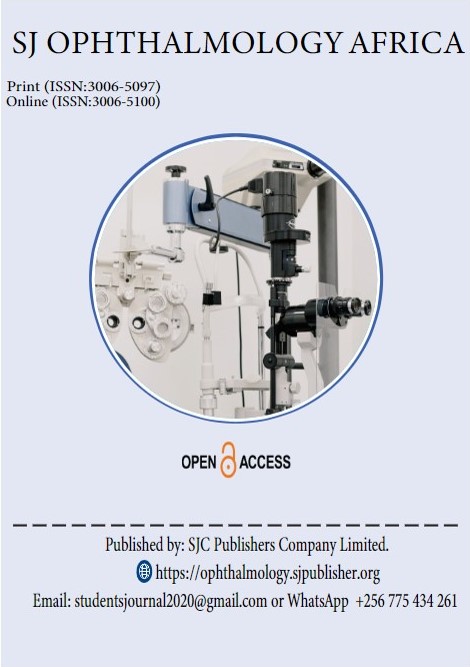Management ocular trauma among patients attending eye care services at Jinja regional refferal hospital. A cross-sectional study.
DOI:
https://doi.org/10.51168/4w8ezm81Keywords:
Health seeking behavior, Eye centers, Ophthalmologic evaluationAbstract
Background
The study aims to assess the Management of ocular trauma among patients attending eye care services at Jinja Regional Referral Hospital.
Methodology
In a cross-sectional descriptive study design 100 respondents were selected using a non-probability consecutive sampling process. Data collected was processed quantitatively by tallying and using non-programmable scientific calculators and was presented using tables and figures. The study was conducted from September 2022 to March 2023.
Results:
The majority received medical management (65%), 20% received surgical management, 10% used self-medication, and 5% used traditional medication. 41% of the respondents had received closed globe injuries, while 59% had received open globe injuries. The majority of the patients (58% ) showed great improvement, 15% showed less improvement, and 12% showed mild improvement. The majority of the patients (40%) presented after 24 hours, 24% were presented to the clinic immediately, 20% were presented after 2 days, and 16% were presented after one week. Among patients who were presented to the clinic after one week, 63% showed a poor prognosis, 25% showed a mild prognosis, and 13% showed a good prognosis.
Conclusion
Health-seeking behavior after sustaining eye injuries was good. The distance of patients from the Hospital affected their health-seeking ability.
Recommendations
The government should establish more equipped specialized eye centers (Hospitals) with adequate staff to increase accessibility to eye care services.
Downloads
Published
Issue
Section
License
Copyright (c) 2025 David Ssekajigo, Adonia Kyakulaga (Author)

This work is licensed under a Creative Commons Attribution-NonCommercial-NoDerivatives 4.0 International License.

